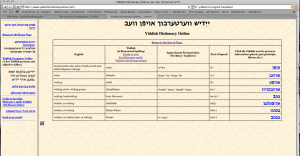When it comes to traditional religion, I’ll readily admit that I’m more Jew-ish than Jewish. You won’t find me in temple unless there’s a Bar mitzvah or a book signing, and I’m certainly not one to pass up an offering of bacon-wrapped shrimp. They’re delish!
But there’s one part of Jewish cultural tradition–besides the latkes–that I have embraced with gusto: the language.
No, I’m not talking Hebrew, which is way too complicated and confusing for the short attention span theater of my brain these days. I get a case of Hanukkah guilt before the gelt every year when need a refresher course on the dreidel symbols.
No, I’m talking Yiddish. And whether you realize it or not, so are you.
You may not be one to just say nu to your kids. (A general word that calls for a reply. It can mean, “So?” “Huh?” “Well?” “What’s up?” or “Hello?” It’s like a verbal grunt, useful in a variety of situations.) And you may not kvetch about your boss. (Which literally means “to press or squeeze,” like a shoe that’s too small, but many people now also use it to mean, “complain, whine or fret.”)
You may not even schmear your bagel. (Which originally referred to a spread of cream cheese on a bagel but has extended to anything that can be spread, and in some cases refers to “an entire set or group of related things”, or the expression “the whole schmear.”) But from schmear to eternity, I’d bet my last bit of gelt (a Yiddish word for money, and for the chocolate coins eaten on Hanukkah by some and year-round by those of us that frequent See’s Candy) that words like glitch?(literally “slip,” “skate,” or “nosedive,” which many people now use to mean “a minor problem or error”) or zaftig (plump, but pleasantly so) have crossed your lips from time to time.
You’re speaking Yiddish and you don’t even know it.
Not to belabor my spiel? (a long, involved sales pitch), or act like a maven ?(which comes from the Hebrew “mevin,” or “one who understands,” but has evolved to mean a know-it-all, and is often used sarcastically) of Yiddish vocabulary, but I’d bet you also use the words klutz?(which literally means “a block of wood,” but is often used for a dense, clumsy or awkward person) and nebbish (an insignificant, pitiful person; a nonentity) without giving them a second thought.
You’re a Yinglish speaker too.
I really don’t mean to be a noodge (to pester, nag, whine or be a pest or a whiner) about this, but chances are good that even somewhat vulgar Yiddish words like dreck (which means worthless material, especially merchandise) and tush (buttocks, bottom, rear end) have crossed your lips from time to time.
So here’s my Hanukkah gift to you: the next time someone asks you if you speak a second language you can tell them you are fluent in Yinglish and you do know more than bupkis (zero, or nothing) about Yiddish.

